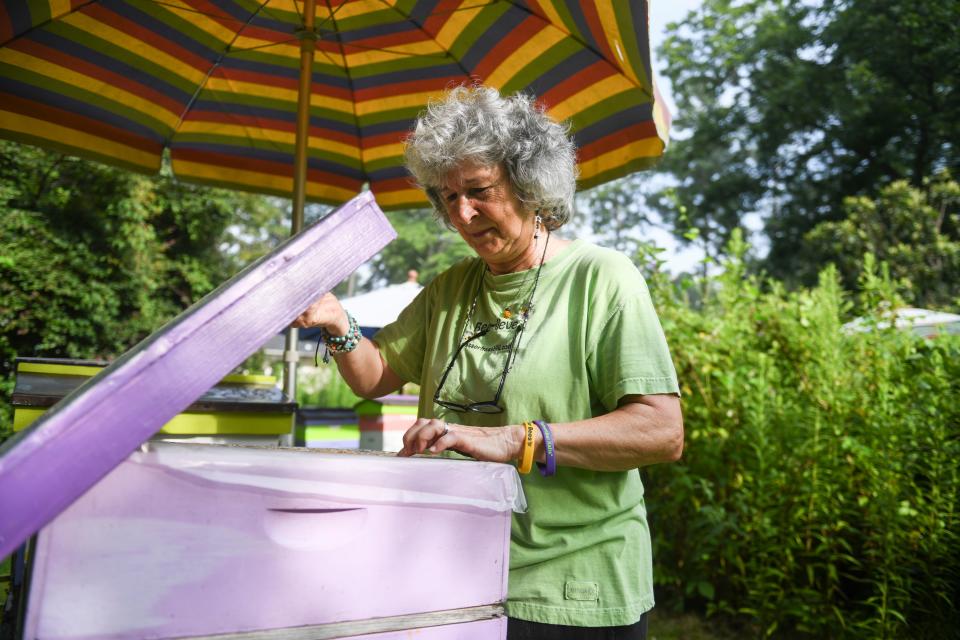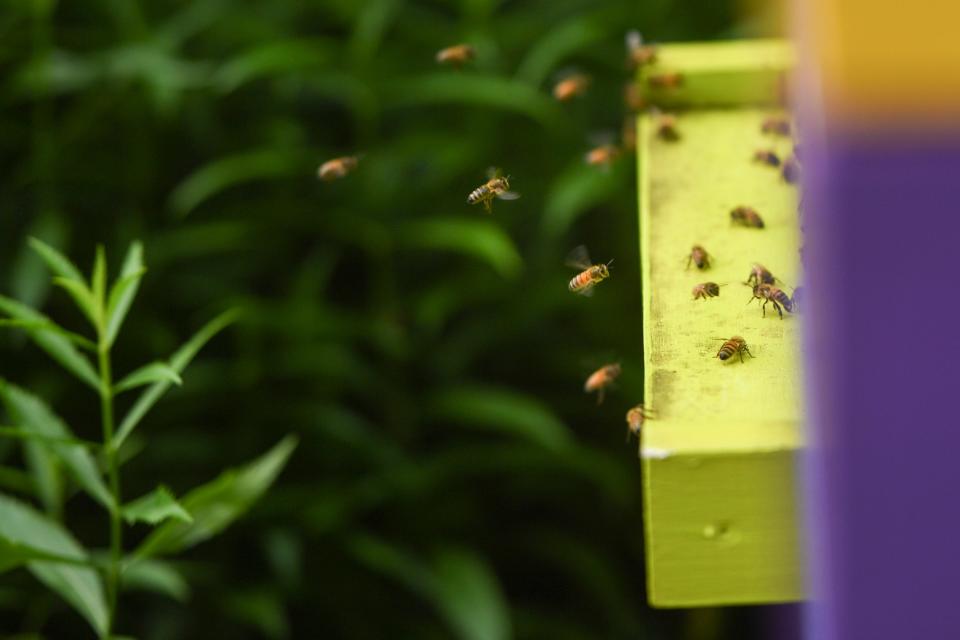'It's not all butterflies and honey': Augusta beekeeper says her job is tough, but fascinating
Whether you’re planning to start beekeeping as a hobby or taking it on as a profession, one expert says there are a few things to keep in mind.
“Beekeeping is hard work,” said Deborah Sasser, owner of Sasserfrass Hill Bee Farms. “It's not all butterflies and honey. You can read as many books as you like. But until you put your hands into a hive of thousands of stinging insects, it's a totally different thing.”
As an experienced beekeeper, Sasser said the proper steps have to be taken to protect her and the bees.
“I've been stung hundreds of times,” said Sasser. “I’ve been stung 67 times at once. That’s the most I’ve ever been stung. I wasn't dressed properly. Even though I’ve built up a tolerance to bee stings I still have to be careful.”

Before taking the honey dip, Sasser worked in media.
“I was a producer for Comcast and while working on a story I met a beekeeper,” said Sasser. “When I walked into his backyard, I was like, 'Ah, this is what I'm supposed to do.' I signed up for the six-week beekeeping course with the Aiken Beekeepers Association. After completing the course, I got my first two hives and that was 15 years ago. I now have 30 hives.”
When it comes to maintaining a hive, no two hives are the same.
“The bees are either stronger or weaker or in a different phase,” said Sasser. “Some are brand new hives, some are old hives. I have to go to each hive and look inside.
"You have to make sure the queen is there. You have to make sure that they have enough food. And as a beekeeper, you have to make sure you don’t take too much honey. Some beekeepers take all of their honey and feed them sugar water. I don’t do that.”
Prime waste: Prime Day wastes can end up in our waterways. Learn how you can prevent it.
Endangered animals: A look at threatened or endangered animals here in Georgia. Here's how to help.
The vitalness of bees
Honeybees are important pollinators for flowers, fruits, and vegetables.
“It's so fabulous the way bees make honey,” said Sasser. “They drink the nectar from a flower, store it in a holding tank above their stomach called the crop, then they bring the nectar home to the hive. While it's in her honey crop she puts enzymes into it. Then she gives it mouth to mouth to a house bee, a bee that's not old enough to go outside. She takes the honey from the foraging bee, puts more enzymes into the nectar then she takes it to the house bee. The house bee takes the nectar and puts it into a honey cell. Then she fans it with her wings and she drives the moisture that's 80-90% water in the nectar. She evaporates it down to 18.6% or below to turn nectar into honey. That's how they make honey.”
Three types of bees in the hive:
Worker bees – forage for pollen and nectar from flowers, build and protect the hive, clean, and circulate air by beating their wings.
Queen bee– lays the eggs that will spawn the hive's next generation of bees. There is usually only a single queen in a hive. If the queen dies, workers will create a new queen by feeding one of the worker females a special food called "royal jelly." This elixir enables the worker to develop into a fertile queen.
Drone bee — mates with the queen.
“Bees are God's favorite insect,” said Sasser. “And people say, ‘Why do you say that?’ It's true. Bees are miraculous. It is a keystone species meaning you can’t take it out of the equation and expect the ecosystem to work.”

Native plants that attract pollinators:
Blue Wild Indigo
Wild Bergamot
Aromatic Aster
Coastal Plain Joe Pye Weed
Bee-coming a beekeeper
For anyone interested in beekeeping, Sasser suggests connecting with an experienced beekeeper.
“I recommend not running out to buy bees right away,” said Sasser. “I suggest joining a local beekeeper group, find someone to mentor you and work with them a few times first. You need to be around other beekeepers to learn. I've had people say, ‘Oh, I'm gonna get bees.’ They work with me one time and never come back.”
For more information about beekeeping, visit Aiken Beekeepers Association
For more information about Sasserfrass Hill Bee Farms located in Augusta at 3108 West Road visit the website at https://sasserfrasshill.com/
This reporting content is supported by a partnership with several funders and Journalism Funding Funding Partners.
Erica Van Buren is the climate change reporter for The Augusta Chronicle, part of the USA TODAY Network. Connect with her at EVanBuren@gannett.com or on Twitter: @EricaVanBuren32.
This article originally appeared on Augusta Chronicle: Honeybees are an important species of pollinator in natural ecosystems

